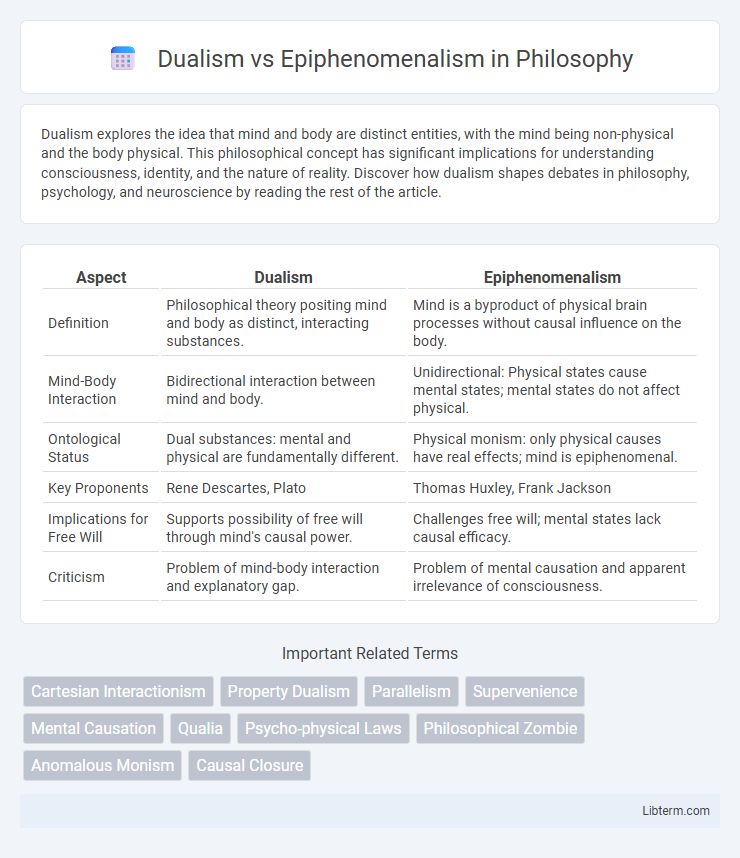Dualism explores the idea that mind and body are distinct entities, with the mind being non-physical and the body physical. This philosophical concept has significant implications for understanding consciousness, identity, and the nature of reality. Discover how dualism shapes debates in philosophy, psychology, and neuroscience by reading the rest of the article.
Table of Comparison
| Aspect | Dualism | Epiphenomenalism |
|---|---|---|
| Definition | Philosophical theory positing mind and body as distinct, interacting substances. | Mind is a byproduct of physical brain processes without causal influence on the body. |
| Mind-Body Interaction | Bidirectional interaction between mind and body. | Unidirectional: Physical states cause mental states; mental states do not affect physical. |
| Ontological Status | Dual substances: mental and physical are fundamentally different. | Physical monism: only physical causes have real effects; mind is epiphenomenal. |
| Key Proponents | Rene Descartes, Plato | Thomas Huxley, Frank Jackson |
| Implications for Free Will | Supports possibility of free will through mind's causal power. | Challenges free will; mental states lack causal efficacy. |
| Criticism | Problem of mind-body interaction and explanatory gap. | Problem of mental causation and apparent irrelevance of consciousness. |
Introduction to Mind-Body Theories
Dualism posits that the mind and body are fundamentally distinct substances, with the mind existing as a non-physical entity interacting with the physical brain. Epiphenomenalism, a subset of dualism, argues that mental states are byproducts of physical brain processes without causal influence on physical events. These contrasting theories address the nature of consciousness and its relationship to neural activity, providing foundational perspectives in philosophy of mind debates.
Defining Dualism: Core Principles
Dualism asserts that mind and body are fundamentally distinct substances, with the mind possessing non-physical, conscious qualities separate from the material brain. Rooted in Cartesian philosophy, dualism emphasizes the interaction between immaterial mental states and physical processes, highlighting the primacy of consciousness in human experience. This contrasts with epiphenomenalism, which treats mental states as byproducts of neurological activity without causal power.
Understanding Epiphenomenalism
Epiphenomenalism posits that mental states are byproducts of physical brain processes without causal influence on the physical world, contrasting with Dualism, which asserts mind and body as distinct substances with reciprocal interaction. This theory emphasizes a unidirectional causal flow from neurological activity to conscious experience, challenging traditional notions of mental causation. Understanding Epiphenomenalism involves recognizing its implications for the philosophy of mind, particularly debates on free will, consciousness, and the mind-body problem.
Historical Overview of Dualism and Epiphenomenalism
Dualism, prominently advocated by Rene Descartes in the 17th century, posits a fundamental distinction between mind and body as separate substances, laying the groundwork for modern philosophy of mind. Epiphenomenalism emerged in the 19th century as a response, asserting that mental states are byproducts of physical processes in the brain without causal influence on the physical world. This historical evolution reflects ongoing debates about consciousness, causality, and the nature of mental phenomena within both philosophical and scientific communities.
Key Philosophers and Influential Thinkers
Rene Descartes is a pivotal figure in dualism, advocating the mind and body as distinct substances interacting closely. In contrast, Thomas Huxley championed epiphenomenalism, proposing mental states as byproducts of physical brain processes without causal power. Contemporary philosophers like David Chalmers debate these perspectives, emphasizing consciousness's elusive role in physicalism and dualist frameworks.
Major Arguments for Dualism
Dualism posits that mind and body are fundamentally distinct substances, supporting arguments like Descartes' Cogito which asserts self-awareness as proof of immaterial mind. The knowledge argument highlights how subjective experiences, or qualia, cannot be fully explained by physical processes alone. Major critiques of epiphenomenalism focus on its inability to account for mental causation, as it views mental states as mere byproducts of brain activity without causal power.
Critiques and Challenges to Dualism
Dualism faces significant critiques centered on the interaction problem, questioning how immaterial mind substances causally influence physical brain states without violating physical laws. Epiphenomenalism challenges dualism by asserting that mental states are mere byproducts of brain processes, lacking causal efficacy, thereby undermining dualism's claim of mind-body interaction. Scientific advancements in neuroscience also challenge dualism by providing empirical evidence that mental phenomena correlate strongly with brain activity, reducing the plausibility of a separate non-physical mind.
Epiphenomenalism: Arguments and Implications
Epiphenomenalism posits that mental states are byproducts of physical brain processes without causal efficacy on the physical world, challenging the traditional mind-body interaction assumed in dualism. Supporters argue that neurological evidence demonstrates brain activity preceding conscious experience, implying consciousness cannot influence neural events. This perspective raises significant implications for free will, suggesting that subjective experiences do not control actions, but rather reflect underlying physical causes.
Comparing Dualism and Epiphenomenalism
Dualism posits that mind and body are distinct substances with causal interaction, whereas epiphenomenalism views mental states as byproducts of physical processes without causal influence on the body. Dualism supports two-way causality between mind and brain, while epiphenomenalism asserts a one-way causality from brain to mind. This fundamental difference challenges interpretations of consciousness, free will, and the nature of mental causation in philosophical and cognitive science debates.
Contemporary Debates and Future Directions
Contemporary debates on dualism versus epiphenomenalism center on the nature of consciousness and its causal efficacy, with dualism positing mind and body as fundamentally distinct substances, while epiphenomenalism views mental states as byproducts of physical processes without causal power. Advances in neuroscience and cognitive science challenge dualist claims by demonstrating neural correlates of consciousness, whereas epiphenomenalism faces scrutiny over its difficulty explaining conscious experience's apparent influence on behavior. Future directions emphasize integrating interdisciplinary research, exploring neurophenomenology, and developing novel experimental paradigms to clarify the mind-brain relationship and reconcile the explanatory gap in consciousness studies.
Dualism Infographic

 libterm.com
libterm.com